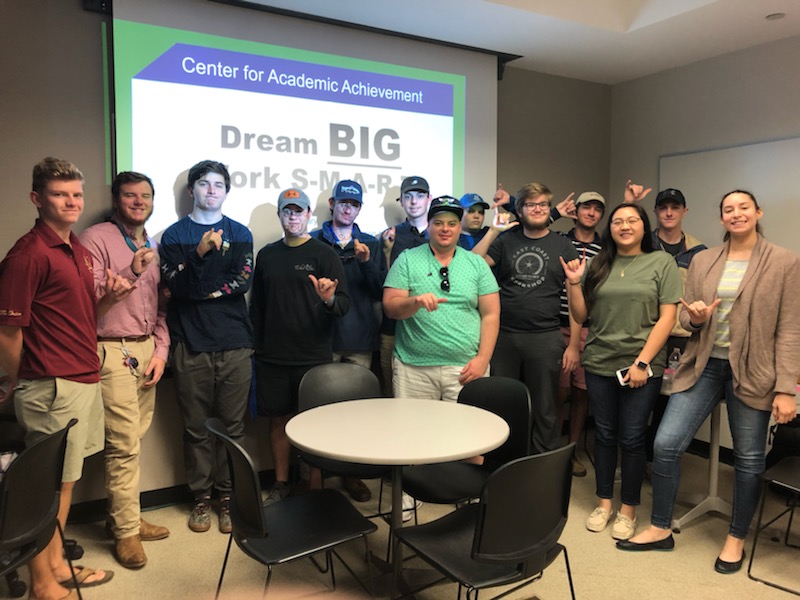

The Center for Academic Achievement, or C.A.A., hosted a workshop titled "Dream Big, Work SMART," where the focal point was developing goals, whether academically or professionally, that are S.M.A.R.T. The acronym in itself specifies that goal-setting should be Specific, Measurable, Attainable, Realistic and Timely. My current employer employs the same exact system with different departments working together to develop S.M.A.R.T. quarterly goals, so it was great to see the same concept applied from a different perspective.
When making an organized planner of our goals, we need to be Specific as possible. This means that there has to be a definitive goal set in place with an actual deadline, and it cannot be vague. For instance, if you operate an online business and want to generate more traffic to your site, you would not say simply, "I want more customers." Rather, you would definitively say, "I want to increase traffic to my website by ten customers per month." Here we have a specific goal that details how many customers are desired and exhibits a timeframe set in place of one month. Next we need to ask ourselves if we can track our goal accurately to ensure progress is being made, or more appropriate to the mnemonic, is our goal Measureable? Measureable means we can create a roadmap leading to our goals in a time-specific fashion.
To gurantee our goals are Attainable, we must also ensure they are Realistic as well. They go hand-in-hand because while we need to set goals for ourselves that are challenging, they must not be impossible at the same time. We have to be intuitive of our capcities and aware of the resources available to us. Not only will our goals be attainable, but we will avoid major pitfalls in the long run resulting in elusive targets. Last, but not least, our objectives need to be Timely, because what good is a goal that we may achieve "someday?" Concrete timeframes established from the beginning will allow us to be more likely to accomplish our goals when there is a motivator such as a deadline.
Check out my S.M.A.R.T. plan for the software engineering degree program at FGCU below!
| 0 | A | B | C |
|---|---|---|---|
1 | Fall 2018 | Spring 2019 | Summer 2019 |
2 | MAP 2302 - Differential Equations (3) | COP 1500 - Intro to Computer Science (3) [Fa, Sp] | COP 2006 - Intro to Programming (3) [Fa] |
3 | MAD 3107 - Discrete Mathematics (3) [Fa,Sp] | COP 2001 - Programming Methodology (3) [Sp] | |
4 | |||
5 | |||
6 | |||
7 | |||
8 | Fall 2019 | Spring 2020 | Summer 2020 |
9 | EGN 3641C - Engineering Entrepreneurship (3) [Fa, Sp] | CEN 3078 - Software Security (3) [Sp] | STA 2023 - Statistical Methods (3) |
10 | CDA 3104 - Computer Org & Assem Lang Progr (3) [Fa] | COP 3530 - Data Structures & Algorithms (3) [Sp] | GEHM2 - |
11 | COP 3003 - Object-Oriented Programming (3) [Fa] | COP 3710 - Intro to Data Engineering (3) [Sp] | |
12 | |||
13 | |||
14 | |||
15 | Fall 2020 | Spring 2021 | Summer 2021 |
16 | CEN 3031 - Software Engineering Fundamentals (3) [Fa] | CEN 3073 - Software Specifications (3) [Sp] | |
17 | COP 4610 - Operating Systems (3)[ [Fa] | CHOOSE Math Elective2 (3-4) | |
18 | IDS 3920 - University Colloquium (W) (3) | TECH1 (3) - | |
19 | |||
20 | |||
21 | |||
22 | Fall 2021 | Spring 2022 | Summer 2022 |
23 | CNT 4104 - Software Proj Comp Networks (3) [Fa] | CEN 4072 - Software Testing (3) [Sp] | |
24 | CEN 4065 - Software Architecture & Design (3) [Fa] | CEN 4935 - Senior Software Engineering Project (3) [Sp] | |
25 | TECH2 (3) - | TECH4 (3) - | |
26 | TECH3 (3) - | ||
27 | |||
28 | |||
29 | Fall 2022 | Spring 2023 | Summer 2023 |
30 | |||
31 | |||
32 | |||
33 | |||
34 | |||
35 |